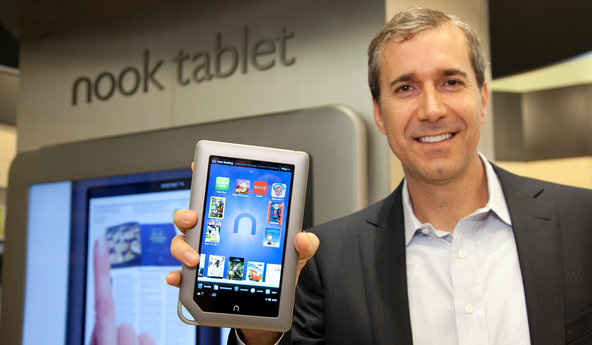 Jim Sulley/Barnes Noble, via NewscastWilliam Lynch, Barnes Noble’s chief executive, shows off the Nook tablet at a bookstore in Manhattan.
Jim Sulley/Barnes Noble, via NewscastWilliam Lynch, Barnes Noble’s chief executive, shows off the Nook tablet at a bookstore in Manhattan.
Barnes Noble is trying to shake up its business by potentially spinning off its fast-growing Nook business. This is yet another effort by the bookseller to rejigger its operations, amid a history replete with spinoffs and attempted deals.
Barnes Noble’s latest bet is that it can separate its Nook unit — its fastest-growing division, but one that demands enormous investments — to attract outside capital that will enable Nook to keep competing against Amazon’s Kindle and Apple‘s iPad. Such a move may entail offering a minority stake to public shareholders, finding a strategic investor or even selling the division outright.
Potential partners for the Nook unit could include Liberty Media, which currently owns a 17 percent stake in Barnes Noble. Executives of Liberty, which invested in the bookseller largely on the promise of its nascent digital content platform, indicated at an industry conference earlier this week that they see Barnes Noble and Nook as separate businesses.
Barnes Noble’s chief executive, William J. Lynch Jr., has said that there is no timeline for making such a decision. But analysts say that the company would be loath to give up control of a business that management has stressed could represent Barnes Noble’s future.
It is not clear what a public Nook company would be worth, in part because Barnes Noble does not yet break out the unit’s full financial information. In its announcement on Thursday, the company said it expected the Nook division to report $1.5 billion in sales for its current fiscal year, with holiday sales growing 70 percent over the comparable period last year.
John Tinker, an analyst at the Maxim Group, estimated in a research note on Thursday that at a highly conservative valuation of 0.6 times revenue, the Nook company could be worth $900 million. But he adds that a higher multiple, perhaps at least one times revenue, may be called for, given the high growth rate.
There is a question, of course, of whether Barnes Noble will proceed down this path at all. It has announced efforts to reshape its business mix in the past, only to see those attempts peter out. In 1999, the company took its Web site public, using the proceeds to market the Web site. (Even then, the portal’s sales were dwarfed by Amazon’s.)
But it reversed course four years later, offering to buy back Barnesandnoble.com’s shares at $2.50, well below the spinoff’s $18-a-share offering price. The unit never turned a profit.
And in 2010, Barnes Noble kicked off an effort to sell itself, a process that wrapped up last summer — with the sale of a $204 million minority stake to Liberty Media. During that lengthy shopping period, advisers to the company spoke to scores of potential buyers, but were unable to attract satisfactory bids, people briefed on the matter said previously.
More drastic shake-ups may still be in the offing. Peter Wahlstrom, an analyst at Morningstar, wrote in a research note that Liberty might still pursue a full takeover of Barnes Noble down the road.
Article source: http://feeds.nytimes.com/click.phdo?i=65157d030027288fecd73c8f2e9a0194